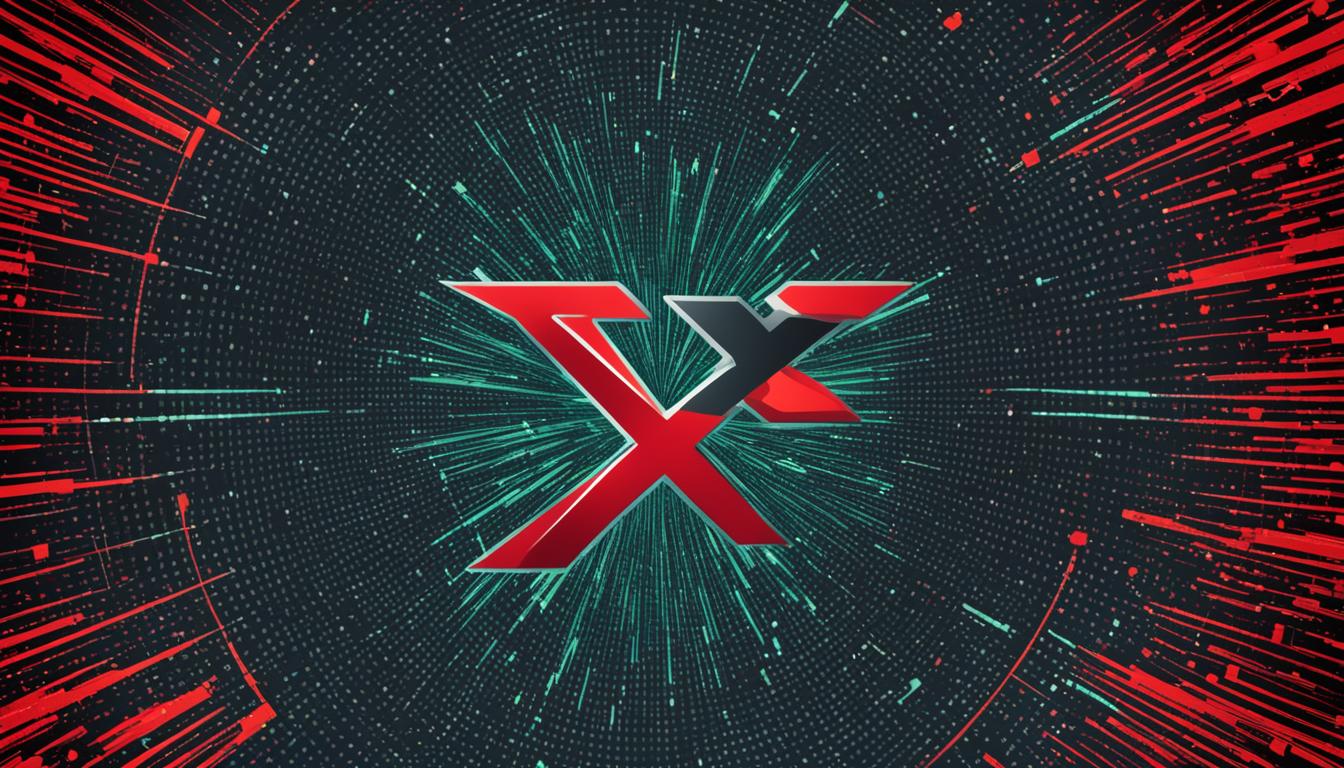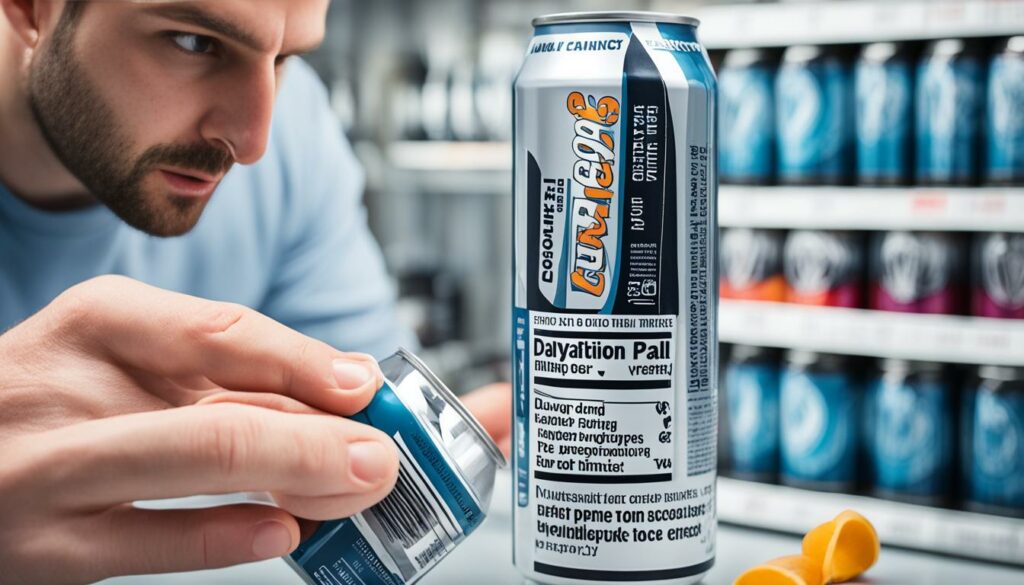
Energy drinks have become a popular choice for those needing a quick pick-me-up. However, it’s crucial to understand the safe daily limits of consuming these drinks to avoid potential risks. In this section, we will explore the recommended daily intake of energy drinks and the consequences of exceeding these limits.
Key Takeaways:
- Knowing the recommended daily intake of energy drinks is essential for your well-being.
- The maximum recommended caffeine intake for adults is 400 milligrams per day.
- Individual factors such as age, gender, and health status can influence your personal boost allowance per day.
- Excessive consumption of energy drinks can lead to negative side effects and health risks.
- Consult with a healthcare provider for personalized guidance on your boost limit in a 24-hour period.
Recommended Daily Intake of Energy Drinks
When it comes to consuming energy drinks, it is essential to be mindful of the recommended daily intake to maintain a healthy balance. The maximum recommended consumption of caffeine per day for adults is 400 milligrams, which is equivalent to about 4 to 5 cups of coffee or 2 energy drinks.
However, it’s important to note that individual factors such as age, gender, health status, and sensitivity to caffeine can influence this limit. Certain individuals, such as those with hypertension, diabetes, or pregnant women, should limit their intake or avoid energy drinks altogether.
Caffeine is a stimulant that can have both positive and negative effects on the body. While it can provide a temporary energy boost, excessive consumption can lead to negative side effects such as insomnia, nervousness, and jitteriness.
To ensure a safe and responsible consumption of energy drinks, it is recommended to monitor your caffeine intake and not exceed the maximum daily limit of 400 milligrams. Consulting with a healthcare provider can provide personalized guidance, especially for individuals with specific health conditions or concerns.
Key Takeaways:
- The maximum recommended caffeine intake per day for adults is 400 milligrams.
- Individual factors such as age, gender, health status, and sensitivity to caffeine can influence this limit.
- Individuals with conditions like hypertension, diabetes, and pregnant women should limit their intake or avoid energy drinks altogether.
- Monitoring caffeine intake and not exceeding the maximum daily limit can help avoid negative side effects.
- Consulting with a healthcare provider can provide personalized guidance on energy drink consumption.
Safe Consumption of Energy Drinks
Consuming one energy drink per day is generally considered acceptable for most healthy individuals. The caffeine content in energy drinks ranges between 80-200 mg per serving. It’s important to be mindful of the total caffeine intake and not exceed 400 mg per day to avoid negative side effects like insomnia, nervousness, and jitteriness.
“It’s important to be mindful of the total caffeine intake and not exceed 400 mg per day.”
However, specific limits for energy drink consumption may vary depending on individual factors, so it’s always best to consult with a healthcare provider for personalized guidance.
“specific limits for energy drink consumption may vary depending on individual factors”
| Energy Drink Brand | Caffeine Content (per serving) |
|---|---|
| Brand A | 80 mg |
| Brand B | 120 mg |
| Brand C | 160 mg |
“Consult with a healthcare provider for personalized guidance.”
Remember, moderation is key when it comes to energy drinks. By understanding and adhering to safe consumption limits, you can enjoy the benefits of an energy boost without putting your health at risk.

Potential Risks of Excessive Energy Drink Consumption
While energy drinks can provide a quick boost of energy, consuming them in excessive amounts can pose several risks to your health. Exceeding the recommended daily limit of 400 mg of caffeine, the main active ingredient in energy drinks, can lead to negative side effects and long-term health consequences.
Some of the potential risks associated with excessive energy drink consumption include:
- Palpitations: Consuming too much caffeine can cause rapid or irregular heartbeats, also known as palpitations. These palpitations can be uncomfortable and may even escalate to more serious cardiovascular issues.
- Tremors: High intake of caffeine can induce tremors or involuntary muscle contractions, making it difficult to perform tasks that require fine motor skills or precision.
- Agitation: Excessive caffeine intake can lead to restlessness, irritability, and feelings of nervousness or anxiety.
- Gastrointestinal Upset: Energy drinks often contain high levels of caffeine and other stimulants that can irritate the stomach lining, leading to digestive issues like stomach pain, nausea, and diarrhea.
- Increased Risk of Other Addictive Behaviors: Regular consumption of energy drinks, especially in excessive amounts, can potentially increase the risk of developing other addictive behaviors due to the high caffeine content and the stimulating effect on the brain.
It’s important to note that energy drinks are often high in added sugars, which can contribute to various health problems like obesity, diabetes, and dental decay. The Dietary Guidelines for Americans recommend limiting added sugar intake to no more than 10% of total daily calories.
In summary, excessive energy drink consumption can have negative side effects on both your physical and mental well-being. It’s crucial to be aware of the potential risks and to consume energy drinks in moderation, keeping in mind the recommended daily limit of 400 mg of caffeine. Prioritizing a balanced and healthy lifestyle, including adequate sleep, proper nutrition, and staying hydrated, is key to maintaining overall well-being.

| Negative Side Effects | Health Risks |
|---|---|
| Palpitations | Cardiovascular issues |
| Tremors | Impaired motor skills |
| Agitation | Restlessness, irritability |
| Gastrointestinal Upset | Stomach pain, nausea, diarrhea |
| Increased Risk of Other Addictive Behaviors | Potential for developing other addictions |
Conclusion
In conclusion, it is essential to consume energy drinks in moderation and be aware of the recommended daily intake limits. The maximum recommended caffeine intake for adults is 400 mg per day. However, individual factors such as age, gender, health status, and caffeine sensitivity should also be considered. Consulting with a healthcare provider can provide personalized guidance to ensure safe consumption.
It is important to remember that relying solely on energy drinks for energy is not a substitute for proper sleep, nutrition, and hydration. While energy drinks can provide a quick boost, maintaining a healthy lifestyle with adequate rest, nourishment, and hydration is crucial for overall well-being.
By understanding the safe daily boost allowance and practicing moderation, individuals can enjoy the benefits of energy drinks without compromising their health. Always prioritize your wellness and make informed choices to maintain a balanced and energized life.
https://iqnect.org/health-medical/trilagavit-b1-b6-b12/
FAQ
How many energy drinks can I have in a day?
The safe daily limit for consuming boost energy drinks is generally considered to be one drink per day for most healthy individuals. However, individual factors such as age, health status, and sensitivity to caffeine may affect this limit. It’s always best to consult with a healthcare provider for personalized guidance.
What is the maximum recommended caffeine intake per day for adults?
The maximum recommended caffeine intake per day for adults is 400 milligrams. This is equivalent to about 4 to 5 cups of coffee or 2 energy drinks. It’s important to be mindful of the caffeine content in energy drinks and not exceed this limit to avoid negative side effects.
Are there any limits on energy drink consumption?
While consuming one energy drink per day is generally considered acceptable for most healthy individuals, it’s important to be aware of individual factors that may affect this limit. Factors such as age, health conditions, and sensitivity to caffeine can vary from person to person. Consulting with a healthcare provider can provide personalized guidance on safe energy drink consumption.
What are the potential risks of excessive energy drink consumption?
Excessive energy drink consumption, exceeding 400 milligrams of caffeine per day, can lead to adverse side effects such as palpitations, tremors, agitation, gastrointestinal upset, and increased risk of other addictive behaviors. It’s also important to be mindful of the added sugar content in energy drinks, as high intake of added sugars can contribute to health problems.
What is the safe daily boost allowance?
The safe daily boost allowance is generally considered to be one energy drink per day, keeping within the maximum recommended caffeine intake of 400 milligrams. It’s important to remember that energy drinks should be consumed in moderation and should not replace proper sleep, nutrition, and hydration for overall well-being.
